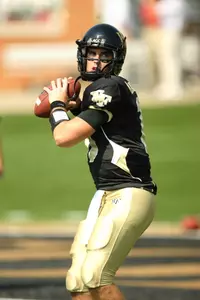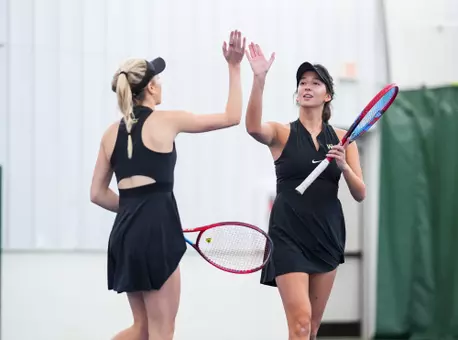Wake Forest Athletics

Gold Rush: 2003 Women's Tennis Preview
2/17/2003 12:00:00 AM | Women's Tennis
Feb. 17, 2003
By Jay Reddick
The Wake Forest women's tennis team started the year with a symbolic goodbye to its past. Now, it's ready to look forward to what lies ahead.
The Deacons' fall season opened Feb. 1 with a home match against Yale, which meant the return of former assistant coach Chad Skorupka, now the Elis' head coach, and former player Maren Haus, now Skorupka's assistant, to Winston-Salem.
Add in former All-American Janet Bergman's presence on the sidelines as a Deacons assistant coach, and it was old home week. But Bergman, Haus and national champion Bea Bielik are out of college eligibility now, and coach Brian Fleishman and the 2003 Deacons are hoping to follow in their footsteps.
The current Deacons are led by a pair of sophomores with some big wins to their names. Karin Coetzee came to Wake Forest from South Africa a year ago with high expectations, and she has more than lived up to them. A 16-6 singles match record included a solid 6-2 against the ACC last spring, and a pair of flight victories this fall upped her ranking into the top 70 nationally. As she matures, Fleishman said, she continues to become more of a leader.
"Karin is a very talented, all-court player, and can beat anybody on any given day," Fleishman said. "What we have to work on with her is her mental game. She's got all the shots, but without the mind, your game doesn't really work out for you. Bea (Bielik) is a good example...it took her a couple of years to put it all together mentally, and look where she ended up."
Katie Martzolf is the other sophomore who will occupy the top of the lineup. Martzolf was second on the team last year with 28 victories (in 37 matches) and overpowered even more opponents this fall in reaching the singles and doubles finals at the Deacon Classic. She also is ranked in the top 70 by the Intercollegiate Tennis Association.
"Katie is more mentally tough but doesn't have the strokes that Karin does," said Fleishman. "They're both getting better every day, and they understand it's their job to lead the team. The only fear in that situation is that they get complacent, and they don't think they're being pushed, but the players below them are doing a good job, and they're making each other better."
The other four players on Wake's roster bring a mix of specialties to the court. Aimee Smith, a junior who is the team's captain, has teamed with Coetzee to form a potent doubles team. The duo is 15-9 together and ranked 13th in the region. Smith's greatest singles moment came two years ago, when she earned the deciding point to push the Deacons into the final 16 of the NCAA tournament.
"Aimee has a big heart and a lot of experience," Fleishman said. "I depend on her a lot as team captain, and she wants to win every match for Wake Forest."
Junior Elizabeth Proctor has exhibited a strong baseline game ever since she came to Wake Forest, but this fall, as she refined a more serve-and-volley style, her record improved. She finished the fall 6-3 as a single and will be counted on to match that this spring.
"Elizabeth is one of the best baseliners in the business," Fleishman said. "She's making huge strides to be more diverse, and it's paying off. She's one of those who'll never say quit. I know she'll do good things."
Danielle Schwartz comes at the perfect diverse game from the opposite side - as a serve-and-volleyer learning to stay more conservative on the baseline. The improvement especially showed in doubles, where she teamed with Martzolf to finish 7-2.
"Danielle's baseline game has really come along since summertime," Fleishman said. "I've been pleased with what I have seen."
The unknown factor in the Deacons' play this spring is Sandie Knight. The Australian freshman began school at Wake Forest in January, and hasn't played competitively against another college player in America. On the positive side, the last Deacon player to join midyear was Coetzee, and that has worked out well so far.
"Anytime you come in midyear, you don't know how they'll react," Fleishman said. "She's making the transition well so far, but she has to figure out what college tennis is all about."
Much of Knight's transition so far has been weather-related. It was over 100 degrees when she left Australia in the heat of their summer and has seen two major snowfalls since her arrival.
"Thank God for indoor tennis centers," Fleishman said.
A six-player roster is a calculated risk for Fleishman. It allows him to save a pair of scholarships for big-time recruits next season, but it also means that any major injury this spring puts his team in position to forfeit at least one point per match. Still, Fleishman sees this as an opportunity.
"We're going to use this year to get some experience under our belt and get better," Fleishman said. "You can't get through a year without illness or injury, but the girls know they just have to play through that unless they can't walk. But these girls are tough enough.
"Two years ago, we were in the same situation, and that worked out OK. We still finished in the top 15 and knocked off some teams. There were some anxious moments, but there are those every season.
"The big thing is, everybody plays, and everybody realizes that they have huge shoes to fill. The teams that came before them have set the standard, and they're able to meet it."



